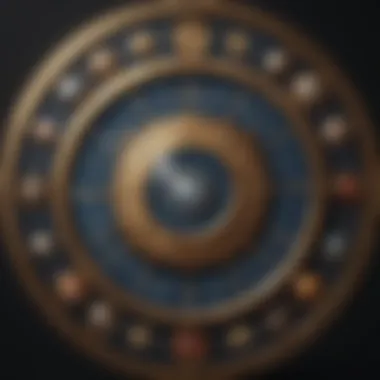Exploring Birth Dates: Insights into Fortune-Telling


Intro
In investigating the influence of birth dates on fortune-telling, it becomes essential to understand the symbolism and narrative present within astrology. Birth dates serve as more than just numerical markers; they hold intricate meanings that unfold through various frameworks such as astrology, numerology, and tarot. These methods, rooted in cultural traditions, seek to derive insights about individuals based on their zodiac signs or specific numerological profiles.
By focusing on how one's birth date channels energies and influences life choices, we pave a way towards deeper self-awareness. This exploration not only fuels personal insights but also aids decision-making, offering clarity to life's many complexities.
Characteristics of Each Zodiac Sign
The zodiac system divides the year into twelve distinct signs, each representing unique characteristics. Every sign holds particular personality traits, virtues, and flaws that shape individual behavior and interactions.
Overview of personality traits
- Aries (March 21 - April 19): Assertive and energetic.
- Taurus (April 20 - May 20): Practical and reliable.
- Gemini (May 21 - June 20): Versatile and communicative.
- Cancer (June 21 - July 22): Emotional and nurturing.
- Leo (July 23 - August 22): Charismatic and dramatic.
- Virgo (August 23 - September 22): Analytical and detail-oriented.
- Libra (September 23 - October 22): Diplomatic and fair-minded.
- Scorpio (October 23 - November 21): Intense and passionate.
- Sagittarius (November 22 - December 21): Adventurous and optimistic.
- Capricorn (December 22 - January 19): Disciplined and responsible.
- Aquarius (January 20 - February 18): Innovative and visionary.
- Pisces (February 19 - March 20): Intuitive and compassionate.
Strengths and weaknesses
Each sign also embodies a set of strengths and weaknesses, contributing to their overall persona. Strengths lend an advantage in navigating partnerships while weaknesses require conscious management to foster personal growth.
Compatibility with other signs
Understanding compatibility provides additional insights into relationships and interactions. Notably, elemental associations can suggest which signs might create harmonious or conflicting situations. For example:
- Fire Signs (Aries, Leo, Sagittarius) tend to harmonize well with Air Signs (Gemini, Libra, Aquarius), promoting mutual inspiration.
- Meanwhile, Earth Signs (Taurus, Virgo, Capricorn) often find a grounded synergy with Water Signs (Cancer, Scorpio, Pisces), nurturing stability.
Through examining compatibility geometry, seekers can gain a better grasp of whom they connect with naturally.
Astrology infuses relationships with a deeper understanding. By learning our signs, we can outline the pathways for more authentic experiences in love and friendship.
These explorations into zodiac signs set the groundwork for delving deeper, as we transition into understanding daily, weekly, and monthly horoscopes in the subsequent chapter.
Understanding Fortune-Telling
The realm of fortune-telling melds ancient wisdom with modern curiosity. It suggests that one's date of birth might hold the keys to various aspects of life. This exploration enables individuals to seek personal insights, guide decision-making, and understand future potential. Of particular interest is how various methodologies consistently associate birth dates with destinies.
Definition and Overview
Fortune-telling refers to practices intended to gain insight regarding future events or uncover hidden truths about life. These techniques often include astrological predictions, tarot readings, and other esoteric methods. Each practice has nuances yet shares a common thread. They all suggest that knowing certain factors about individuals—like their date of birth—can illuminate personal characteristics and life paths.
For instance, astrology hinges on celestial movements, stating that planets and stars at the time of a person’s birth significantly impact their personality traits. Conversely, numerology derives from numeric values tied to a person's birth date. Such calculations aim to reveal essential life themes and significant periods.
By becoming more familiar with these methodologies, one encounters a disciplined structure for understanding human experiences. Searching for meaning in life through birth dates provides a pathway for introspection and growth.
Historical Context
Historically, fortune-telling has influenced cultures across various epochs and geographies. Its roots can be traced back to ancient civilizations. For example, Babylonian astrologers observed celestial phenomena and thoughts on their influence on individual fate. Their work laid foundations for what we know as astrology today.
In Eastern traditions, birth dates play a vital role in customs like Chinese astrology. Here, the lunar calendar holds sway, dictating personality traits and fortunes based on year, month, day, and sometimes even time of birth.
Cultural attitudes towards these practices have experienced shifts over time. Science has risen to question fortune-telling’s validity, and societal skepticism often accompanies it. However, appreciation for this domain persists amongst those seeking deeper understanding and connection to their birth journeys.
By studying past and present aspects of fortune-telling, we encapsulate how various practices have transitioned into tools for navigating complex human experiences.
In continuing this exploration, one gains a richer comprehension of the place birth dates hold in fortunetelling as an intertwined study of identity, culture, and personal growth.
The Role of Date of Birth in Divination
The date of birth serves as a critical element in the realms of astrological and numerological practices. In astrology, it is seen as a mapping point in the celestial arrangement at the time of one’s birth. Numerology, on the other hand, interprets the numbers associated with the birth date to derive significance pertaining to life’s journey.
Understanding the role of birth dates opens doors both to self-discovery and decision-making. It also invites individuals to ponder upon their place in the universe. The underlying assertion is that the specific conjunction of celestial bodies and the numbers tied to a birthday can influence a person’s character, strengths, weaknesses, and overall destiny.
Benefits of Recognizing the Connection
- Self-Understanding: Yoga practitioners utilize their birth dates for in-depth psychological profiling. This can lead to personal growth and fulfillment.
- Informed Decision-Making: By consulting astrological or numerological insights, individuals may feel better equipped to navigate life choices.
- Cultural Insight: Many societies attribute profound meanings to birth dates, enhancing connections to cultural heritage.
- Community and Belonging: Engaging in fortune-telling practices based on birth dates can foster a sense of belonging within various esoteric groups.


Thoughtful consideration of one’s date of birth thus paints a comprehensive picture of possibility, augmenting the human experience with ardent interpretations related to both past and future.
Astrological Foundations
Astrology hinges significantly on the positions of celestial bodies at the moment of birth. Each aspect of an individual’s astrological chart, such as sun signs, moon placements, and rising signs, all derive relevance from one’s date of birth. The study of astrology provides frameworks to understand an individual’s potential paths and experiences typical according to precise positioning of planets and stars.
- Sun Sign: Represents one's core essence and fundamental traits.
- Moon Sign: Reflects emotions and internal responses.
- Rising Sign (Ascendant): Describes how others perceive an individual.
- Connection to Elements: Fire, Earth, Air, and Water in zodiac signs have varied implications linked to personality.
These foundational aspects ground fortune-telling practices in astrological reasoning. They open up insights into deeper realms of character analysis, enabling enthusiasts to gather a broader understanding of personal destiny.
Numerological Interpretations
On the other hand, numerology interprets numerical values that align with one’s date of birth. The foundational idea is that numbers possess their own vibrations and meanings, impacting various areas of life.
Calculating the life path number is one of the prominent methods in numerology. It is derived by reducing the birth date into a single digit. This digit specifies personality traits and life challenges.
- Life Path Number: Represents one's journey and significant hurdles throughout life.
- Core Numbers: Derived from additional aspects of the birth date (e.g., birthday number) offer deeper insight.
Furthermore, cultural differences yield varied interpretative layers in numerology highlighting local traditions. Aligning these interpretations can certainly enhance understanding within fortune-telling practices.
Ultimately, both astrology and numerology converge on the central theme that the date of birth serves not merely as a delineation of time but as a vital compass guiding one’s explorations of fate and destiny.
Astrology: The Cosmic Connection
Astrology plays a pivotal role in understanding the significance of birth dates. It is believed that the moment of one's birth, aligned with the cosmos, influences not just their personality but also their destiny. By exploring astrological principles, individuals can gain insights into various aspects of their lives. These insights are derived from the positioning of celestial bodies at the time of birth. As such, astrology offers a profound avenue for self-exploration and understanding life’s journey.
Understanding Zodiac Signs
Zodiac signs represent twelve constellations through which the sun passes during the year. Each sign holds distinct characteristics that can shed light on different personality traits, preferences, and potential challenges.
For example, someone born under Aries is often deemed adventurous and assertive, while a Taurus may be regarded as reliable and sensual. Understanding these signs allows individuals to see how their zodiac correlates with their actions and behaviors. Additionally, bad days can often be forecasted based on one’s sign.
- Fire Signs (Aries, Leo, Sagittarius) - Known for their energy and dynamism.
- Earth Signs (Taurus, Virgo, Capricorn) - Often practical and grounded.
- Air Signs (Gemini, Libra, Aquarius) - Recognized for their intellect and communication prowess.
- Water Signs (Cancer, Scorpio, Pisces) - Usually intuitive and emotional.
Houses and Their Implications
Astrology divides the celestial sphere into twelve houses, each governing different life aspects. The house in which a planet resides in a person’s natal chart significantly influences how that area is experienced. For instance, if Mars is in the 7th house, it can strongly affect relationships, often leading to passionate or confrontational interactions.
The key is understanding how to interpret these houses:
- 1st House: Self-image and personality.
- 2nd House: Wealth and possessions.
- 3rd House: Communication and intellect.
- 4th House: Family and home life.
- 5th House: Creativity and pleasure.
Grasping the implications of these houses helps in making informed decisions and enhanced self-awareness.
Planetary Influences
In astrology, the planets symbolize different energies and focus areas in life. Their alignment can suggest trends or influential experiences. For example, Mercury governs communication and intellect, while Venus may align with love and relationships.
By acknowledging these planetary influences, individuals grasp the energies affecting them:
- Sun: Core self – - creativity and ego.
- Moon: Emotional self – subconscious and instincts.
- Saturn: Discipline – restriction and responsibility.
Understanding these influences allow individuals to navigate challenges and embrace strengths.
“Astrology is a map of the soul; a way to understand relationships in the complex fabric of life.”
In summary, astrology presents an elaborate framework for decoding birth dates through various celestial relationships, helping individuals realize and embrace their authentic selves. The cosmic intricacies wrap around enriching personal insights and forecast trajectories, thus enhancing fortune-telling practices.
Numerology: The Power of Numbers
Numerology is a fascinating field that explores the symbolic significance of numbers and their impact on personal destiny. The essence of a person's birthdate can manifest through these numbers. Using numerology can provide clarity about one’s self, as well as about important life events.
Validating the worthiness of numbers gives strength to a topic of great import. Individuals seeking guidance through personal insights often find numerology beneficial, as can be seen in various cultures. It serves as a compass for decision-making. With one silent touch, it can script the outline of connections—meaningful connections between choices and outcomes.
Calculating Life Path Numbers


To calculate a Life Path Number, one must first reduce the birth date into a single digit. This incorporates the date, month, and year of birth by following the formula as below:
- Break down the birth date.
- Add the numbers together until reaching a single digit (1-9) or master numbers (11, 22, 33).
For example, if someone is born on July 20, 1991:
- Break down: 7 (July) + 2 (20) + 1+9+9+1 (1991) = 7 + 2 + 20 = 29
- Reduce: 2+9 = 11 (master number).
Life Path Numbers offer insight into personality traits, preferred approaches to challenges, and connections to destiny. Each number is inherently linked to specific characteristics:
- 1: Leadership
- 2: Cooperation
- 3: Creativity
- 11: Inspiration
Understanding these numbers serves one in navigating life's complexities.
Interpreting Core Numbers
Core numbers expand a person's numerological profile by focusing on attributes of the Life Path Number, Expression Number, and Soul Urge Number. Each serves unique insights about individuals.
- Life Path Number: Represents destiny and the overall learning focus within this lifetime.
- Expression Number: Also known as Destiny Number, suggests natural abilities and gifts.
- Soul Urge Number: Reflects true desires and what makes someone innately happy.
Interpreting these numbers requires attention to each calculation’s context. For instance, a strong Expression Number might indicate artistic talents, while a pronounced Soul Urge Number might signify a yearning for spiritual fulfillment. Thus, understanding these connections can serve to enlighten personal quests.
Cultural Variations in Numerology
Cultural context significantly affects how numerology is perceived and practiced. Different cultures have systems that either share similarities or exist independently of each other:
- Western Numerology: Commonly approaches the subject by focusing on the Birth Date System and Master Numbers, emphasizing individuality and personal kismet.
- Chinese Numerology: Places emphasis on auspicious combinations. The number 8 here stands out as favorable, often linked with prosperity.
- Indian Numerology: Utilizes Nakshatras or lunar mansions to connect numerological principles with astrology.
Each culture develops a unique lens through which to interpret numbers. Understanding these variations can enhance personal numerological insights and foster deeper appreciation for multiple beliefs.
The power of numbers goes beyond arithmetic; it envelopes broader interpretations that shape individual destinies.
In summary, numerology offers a potent tool for self-exploration, revealing underlying truths in life and guiding decisions through the understanding of numbers.
Cultural Perspectives on Birthdate Significance
The cultural significance of birth dates extends beyond mere coincidence. It shapes personal identity, cultural beliefs, and spiritual practices. In the discourse on fortune-telling, understanding these perspectives allows for a richer exploration of how individuals relate to their birth dates. The interpretations of birth dates can vary greatly depending on cultural contexts, leading to distinct methods of forecasts and insights into personal destiny. Exploring these cultural perspectives reveals key aspects that benefit seekers of personal growth as well as users of astrology and numerology. It also emphasizes the considerations surrounding these practices.
Eastern vs.
Western Practices
In Eastern traditions, birth dates may hold a profound connection to specific philosophical and spiritual concepts. The Chinese zodiac, for instance, highlights how animals linked to birth years can embody certain characteristics relevant to fortune in life. For example, someone born in the Year of the Rat may be seen as resourceful and intelligent.
The Chinese follow a lunar calendar, so the determination of one’s zodiac sign involves more complex calculations. This practice not only provides insights into personality traits but is also interwoven with local celebrations and rituals that honor ancestors and cosmic influences.
Conversely, Western practices, such as those seen in astrology, focus on the positions of celestial bodies at the time of birth. In this view, each zodiac sign emphasizes aspects such as love, career, and personal growth. Furthermore, Western astrology employs a fixed calendar where individuals analyze the interrelationship among stars, planets, and signs.
- Common Features of Eastern and Western Practices:
- Cultural Rituals: Celebrations often interpret personal characteristics through cultural lenses.
- Value Representations: Both practices assign animals or celestial beings traits related to one’s fortune.
- Astrological Charts: Both systems use charts to glean insights into personal and communal events.
Understanding the differences can lead to greater appreciation of divinatory practices in varied cultures and can support deeper analysis for those invested in these insights.
Indigenous Beliefs and Traditions
Indigenous cultures bring their unique perspectives on the significance of birth dates. Many tribal traditions posits that an individual's life path is guided by their birth timing, often corresponding with natural phenomena. For instance, native-american traditions place great importance on the connection to nature, where birth periods aligning with seasonal changes are believed to affect an individual’s traits and life purpose. They consider lunar phases, which create connection to natural rhythms.
Furthermore, certain local beliefs incorporate elements like totems or spirits, shaping an understanding of a person's place within the community. Each birth date, therefore, encapsulates unique qualities tied to both personal and communal identity.
Indigenous practices often involve storytelling, ceremony, and ritual as methods of understanding one's birth date significance. By embracing these cultural narratives, perceptions of personal growth and human destiny extend beyond Western models.
These culturally grounded beliefs provide what many value as rich layers of continuity, offering insightful pathways back to ancestral knowledge and wisdom. Branching out into these diverse methods can enhance personal exploration for those in the realms of fortune-telling.


Birth dates carry stories not only for individuals but also for communities, connecting one’s fate to an intricate world of traditions and values.
Practical Applications for Personal Insight
Understanding the practical applications of birth dates in fortune-telling is fundamental for those interested in astrology and numerology. It is not merely an academic investigation; it can serve as a guide in one's personal life. This section discusses how using astrological principles and numerological insights can lead to significant self-discoveries and informed decision-making.
Using Astrology for Self-Discovery
Astrology provides various tools for self-discovery, which hinge on accurately understanding one's astrological chart. By analyzing significant components within the chart, such as the positions of planets at the time of birth and their relationships to one another, an individual may glean aspects of their personality and innate tendencies.
- Zodiac Sign Analysis: Your sun sign can determine core traits that manifest in daily life. Although there are variations and complexities involved, knowing your sun sign gives insight into certain attributes such as motivation and approach to challenges.
- Ascendant and Houses: The ascendant signifies how you present yourself to the world, while houses signify the realms of life affected by various planetary movements. Together, they provide a layered understanding of one's personal landscape.
- Transits and Progressions: Studying planetary transits enables anticipating changes, opportunities, and challenges. For example, a favorable transit might signal an optimal time to pursue career advancement, while negative aspects could necessitate caution.
By using these astrological perspectives, individuals can pinpoint themes and cycles in their lives. Proper guidance based on astrological knowledge helps differentiate between momentary feelings and accurate assessments of life events.
Numerology for Decision Making
Numerology also has practical implications, particularly in guiding personal choices that resonate with your objectives and desires. The calculations stemming from your birth date and name can yield critical numbers that reveal patterns influencing decision-making.
- Life Path Number: The life path number indicates the general life focus and greater purposes. This numerical ignition point highlights strengths and obstacles, shaping one’s journey significantly.
- Core Numbers Identification: Other vital numbers, such as the expression number and soul urge number, delve into personal motivations. Understanding these can clarify your strengths and help identify areas worth focusing on.
- Cyclical Approaches: By understanding personal year numbers, which are derived from your birth date as well, one can discern which energies are favorably aligned in specific time frames.
Implementing numerological insights can equip individuals with the foresight to make informed decisions. Rather than following trends or fleeting interests, it nurtures a solid alignment with one’s true self and aspirations.
Skepticism and Criticism of Fortune-Telling
Skepticism surrounding fortune-telling, specifically in the context of astrological and numerological practices, plays a crucial role in understanding these methods. Critics argue that both astrology and numerology lack scientific credibility. Many view fortune-telling as controversial. It can lead to misinterpretation and misguidance, affecting personal decisions.
This critique serves as a humbling reminder for practitioners and enthusiasts. They may benefit from being aware of the limitations and alternative views on practices they hold dear. Here, we can examine two key aspects: scientific perspectives on fortune-telling and the challenges of validation.
Scientific Perspectives
From a scientific standpoint, the principles underlying astrology and numerology do not always align with empirical evidence. Scientists typically emphasize the absence of clear causal links between celestial movements or numerical calculations and individual life outcomes. Key arguments include the following:
- Lack of Empirical Support: Controlled experiments have not demonstrated a verifiable correlation between astrological predictions and real-life events.
- Variability in Interpretations: Different practitioners may arrive at entirely different conclusions using the same birth chart or numerological data.
- Barnum Effect: Generalized statements often resonate with individuals, leading them to see personal meaning where objective reality prevails.
Such perspectives highlight a rift between personal belief systems and scientific methodology.
Challenges of Validation
Validation of fortune-telling practices entails numerous hurdles. Among these, reproducibility stands out. The methods cannot be repeatedly applied to achieve consistent results. Some points to consider include:
- Cultural Subjectivity: Different cultures possess unique interpretations and traditions, resulting in various practices that complicate validation processes.
- Self-fulfilling Prophecies: Individuals may unconsciously align their actions to fulfill predictions, leading to skewed observations about fortune-telling's accuracy.
- Impact of Confirmation Bias: People tend to seek information that validates their beliefs while disregarding contradictory evidence, creating an inaccurate perception of reliability.
In the sphere of fortune-telling, one must remain aware of the intricate dance between subjective belief systems and objective realities. The delicate balance between faith and skepticism fosters a multi-faceted understanding of personal insights.
In summary, while fortune-telling can offer intrigue and insight, skepticism provides necessary critique. It encourages practitioners to approach these practices with a thoughtful and measured perspective.
Culmination: The Personal Journey
The exploration of the connection between one’s birth date and fortune-telling unveils the path through which individuals can strive for greater self-understanding and personal insight. This conclusion emphasizes the significance of recognizing how birthdates shape perceptions, aspirations, and future decisions. While astrology and numerology provide frameworks to interpret these influences, it is the personal integration of this knowledge that often proves most enlightening.
Embracing Personal Insights
To embrace personal insights gained through fortune-telling, individuals must engage in introspection. By considering how one’s date of birth relates to personal experiences, patterns become more evident. Each element within astrology—be it zodiac signs, planetary aspects, or houses—meets critical analysis when believers use their unique experiences to connect with astrological meanings. Similarly, numerology elucidates one’s core characteristics through numbers derived from a birth date. Understanding these inherent traits allows individuals to navigate their lives with a refined sense of purpose.
- Astrological Awareness: Identify key astrological elements:
- Numerological Analysis: Calculate and assess core numbers, such as:
- Zodiac Sign
- Rising Sign
- Moon Sign
- Life Path Number
- Expression Number
- Soul Urge Number
By actively engaging with these insights, individuals cultivate a deeper connection to their life choices, fostering increased confidence and clarity. Growth often stems from periodic reflection. It could be beneficial to document personal journeys over time, noting how initial astrological or numerological insights have influenced life choices and personal development.
The Future of Fortune-Telling
Looking ahead, the evolution of fortune-telling continues to intrigue both practitioners and seekers of wisdom. Technologies may transform how such practices manifest. Digital tools, webinars, and online courses can democratize access. This greater accessibility may encourage broader understanding and acceptance of astrological and numerological frameworks.
- Tech Innovations:
- Interested Communities: Engaging dialogues in online forums, such as Reddit, explore controversies and dynamics surrounding fortune-telling methodologies. Continued conversations can shape trends and beliefs influencing the interpretation of a person’s date of birth.
- Mobile applications for instantaneous charts and readings
- Online platforms for community sharing and insights
Conclusively, the future allows for possible integration of more scientific perspectives with the mystical. As individuals continuously seek out personal truth, fortune-telling will likely adapt, reflecting changing societal views regarding fate and personal agency. Understanding one’s birth date holds vital importance, opening pathways for meaningful growth and exploration.







